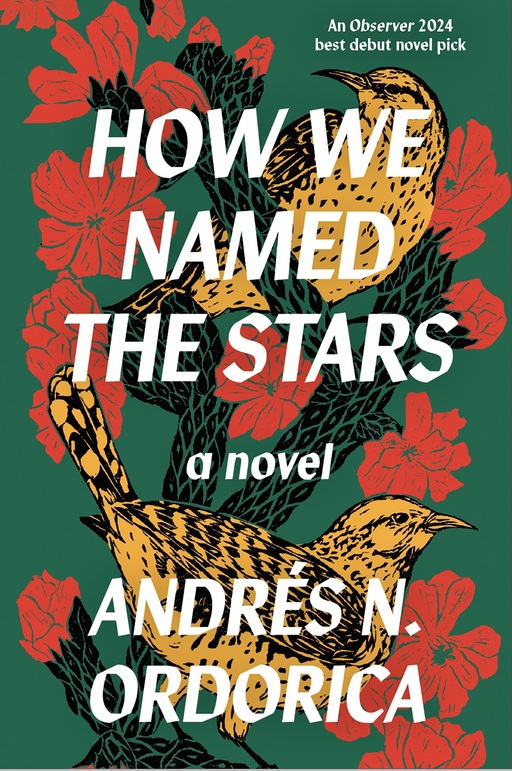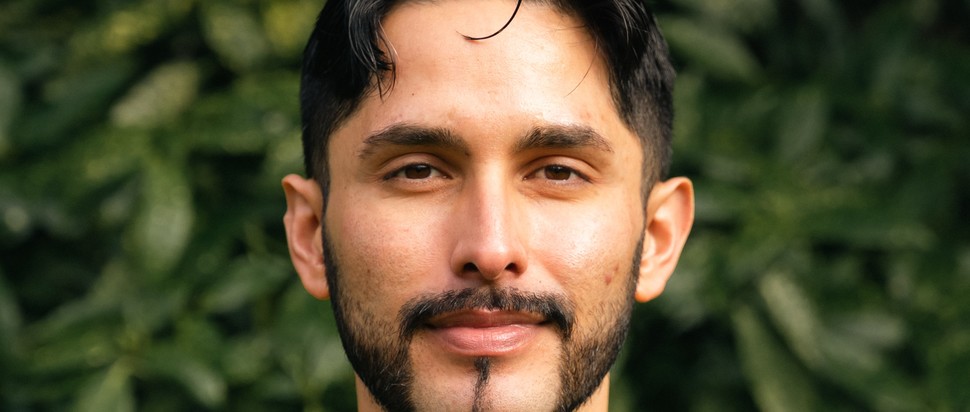Andrés N. Ordorica on debut novel How We Named the Stars
Edinburgh-based poet Andrés N. Ordorica's debut novel retells the quiet queer awakenings of two lovestruck college freshmen in one’s eulogy to the other
On the day I catch up with Andrés N. Ordorica, ahead of the UK launch of his debut novel How We Named the Stars, he is, in his own words, "dealing with horrible jetlag". He has just returned from the US, visiting his family in Northern California, where they emigrated from Mexico in the 1960s, he explains. It is a heritage he shares with his debut novel's central character, Daniel de La Luna.
A shy, overthinking college student whose family moved to the US a generation ago, Daniel is in his freshman year at a fictional college in Upstate New York; a year that proves to be transformative when he meets his blonde-haired, all-American and resolutely straight-seeming roommate Sam Morris. At first, the gulf between their worlds seems unbridgeable. But something exists between them that late-bloomer Daniel isn’t yet equipped to recognise.
Daniel and Sam’s respective quiet, queer awakenings happen in snatches: stolen glances and ambiguously charged hugs, the kind that only happen in the unique combination of forced closeness and perpetual drunkenness of a college campus. For an overthinker like Daniel who narrates the story, the idea that they are deliberate advances from Sam is so inconceivable that the story benefits from the temporal vantage point of being retold in past tense; in which a version of Daniel who is a little older and more assured can look back and see the obvious. Or, at least, what his friends have since told him is obvious.
"[Daniel] can be very pedantic sometimes," says Ordorica. "And so I think [his friends] help to shake him up and be like: 'Okay, get with it, Daniel. Because if you just stay in your head, you’re going to miss out on all of this stuff. You’re an idiot. Please wake up.'" Daniel’s friends are, Ordorica admits, his way of tipping his hat to his group of girl friends from his own university days who were perpetually telling him how annoying he was, pining over people while missing all the cues, such was his own introverted nature.
Ordorica recalls his own freshman year of college as a revolutionary time. "Before I went to university, aside from my uncle, I did not know any gay people," he says. "I grew up in a very military, religious setting… Suddenly there were all these liberal middle-class kids who had barely turned 18 and had been out since they were 15! Like, how do you know that, and how does it shape your worldview? I really wanted to capture that, that a college campus [lets you meet] people who have different lived experiences."
But it would be burying the lede to say that this is the only reason for this novel to be told in past tense. For all the joy and tenderness that the book exudes, it all follows the admission on only the third page (so it is far from a spoiler to reveal it here), that Sam Morris passed away six weeks ago. This fact looms over the boys’ interactions, simultaneously bracing us for the shock and imbuing every missed opportunity, every time the boys tell each other they have "all the time in the world" with a horrible sadness. Reflecting on their first night together, the first time they cross the threshold from best friends to lovers, Daniel describes the grief that is heading his way as 'a wave of both growth and destruction.'
"My central question," says Ordorica, "was, 'What if the first person you fall in love with is the person who [will force you] to face your first personal loss?'" But Ordorica knew early on that Sam’s death needed to happen as quickly as possible, lest it become the hooky, gut-punching plot device that becomes the main talking point. "I realised that for me, it was more about showing how someone is left," he says. "What happens when you’re left behind, and how do you make sense of it? Especially a relationship in which you and the other person who has now passed are the primary guardians of those memories.

"[Daniel is] trying to wrangle with the fact that, aside from a few scatterings of friends who were around while Daniel and Sam were in the same room together, a lot of what he is holding is ultimately just between him and Sam. [When] your grandparent passes you can speak to your parents, or if you have siblings, or if you have cousins, you can sort of share those memories of that grandparent. You can figure it out together and there can be a collective grief, whereas ultimately, this very specific version of Sam is held only by Daniel."
How We Named the Stars is written in the second-person, placing you, the reader, into the shoes of the late Sam Morris. It is as if you are his ghost, hearing Daniel's version of this story posthumously. Ordorica says that after having drafted a more traditional present-tense version, the second-person past tense was a good frame in the sense that, "there are parts of the story that are probably idealised or being told through rose tinted glasses, but I think that makes sense because it’s coming from one person in mourning to their lover."
It also felt appropriate given the aforementioned cultural and religious background that the character shared with the author. Ordorica describes having grown up, like Daniel, in an all-Mexican family with a particularly Latin version of Catholicism in which it is common to speak to the dead. Ordorica’s novel showcases the benefits of this kind of eulogy, delivered not about someone for the benefit of others, but towards the person, as if picking up where you left off when they were alive. It gives space for the good to sit alongside the bad, the speaker not beholden to honouring their memory but instead free to exorcise the necessary pain that remains. When Daniel asks Sam questions like, ‘What stopped you from opening up with me?’, we feel his relief in finally being able to get the question off his chest, even if he will never have a definitive answer.
When Daniel hears the devastating news of Sam’s passing, he is in Mexico visiting his grandfather who is himself grieving the decades-old loss of his son, Daniel’s uncle. Daniel knows very little about him, other than he bears his name, that is until Daniel finds out that his uncle was gay too. The revelation comes in the form of a gift from his grandfather, a box of the late Daniel’s diary entries. While Daniel previously thought himself to be the first queer person in his family, the box proves to be the catalyst for our protagonist to realise that he has been functioning under many false presumptions.
"There's such a beautiful history of queer writing in which it's the character against the world," says Ordorica, but he knew he didn't want this book to reinforce that. He continues: "For me and how I grew up, [I realised that] I had a lot of preconceptions [about] what I thought was the truth." How We Named the Stars became an opportunity for Ordorica to impart what he learned, to anyone who might feel like Daniel: "[That] we often aren’t the only one. Even in family histories, not all stories will have been passed down. Maybe people had to live in the closet or in lavender marriages, or maybe there were versions of people that [existed] but were not passed on."
It is on the plane back to college that Daniel de La Luna begins to write the story that will become How We Named the Stars. Over a seven-day writing stretch, he will go on to lay out his uncle’s journey at the beginning of each chapter. It is a tale of self-assured defiance; of refusal to apologise for his desirous thoughts about the tradesmen in the street; of finding his tribe among the activists who shed light on the AIDS crisis and learning to live authentically.
We get the sense that the story emboldens Daniel to tell his own; one of overcoming loss and opening oneself up to love. Steeped in grief and yet resolutely uplifting, Daniel’s story is one of a young man realising that pain is universal, but so too is beauty. Things move forward, and as they do, we learn to hold grace for the many versions of people and of ourselves. "We all exist with multitudes," says Ordorica.
How We Named the Stars is out now with Saraband. Ordorica will be appearing at Book Fringe in conversation with Eris Young at Argonaut Bookshop on 14 Aug, 6.30pm
